
December 2007
on the Road to Socialist Revolution
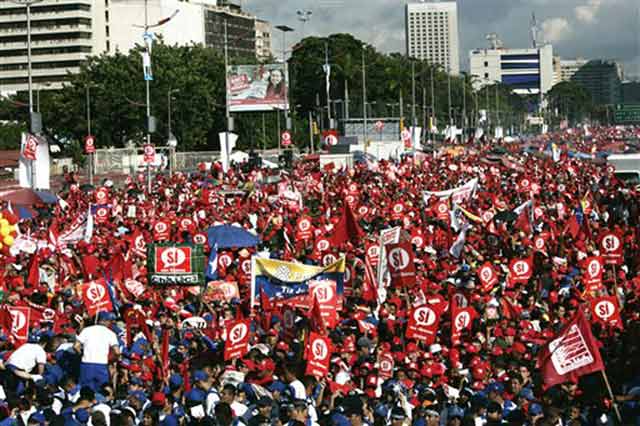
Mass mobilization in Venezuelan capital of Caracas to close campaign for "yes" vote for packet of
constitutional changes drew half a million participants. (Photo: Fernando Llano/AP)
No Political Support to the Bourgeois Populist Chávez –
Build a Revolutionary Workers Party!
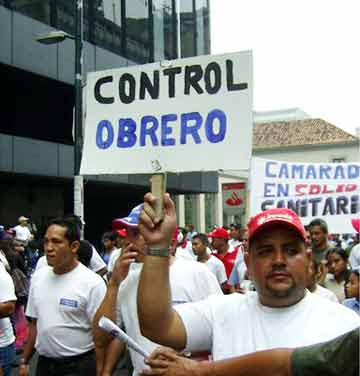 Workers
and supporters of Sanitarios Maracay marched in Caracas December 14
calling for workers control.
Workers
and supporters of Sanitarios Maracay marched in Caracas December 14
calling for workers control.
(Photo: Hands Off Venezuela)
On December 2, Venezuelans
will go to the polls to vote on a proposal to reform 69 articles of the
Constitution of the Bolivarian Republic, adopted in 1999. President
Hugo Chávez
Frías has presented this platter of amendments in order to
“deepen the
Bolivarian Revolution.” While taking opposite positions on the
referendum, both
Chávez supporters (who are voting “sí,” or yes)
and rightist
reactionaries (who are voting “no”) portray the measures as
opening the
door to socialism in Venezuela. This, however, is in no way the case.
The various changes aim at
strengthening presidential power and instituting a series of social
reforms
characteristic of a social-democratic “welfare state” in Europe or a
bourgeois
populist regime in Latin America. Nothing in the 69 articles goes
beyond the
limits of capitalism. They do not expropriate capitalist property and
in fact,
for the first time they give constitutional protection to private
ownership of
the means of production. The fact that the right wing portrays these
mild
reforms as “socialist” just shows what dyed-in-the-wool
counterrevolutionaries
they are.
Proletarian revolutionaries
who fight for a genuine socialist revolution, that is for the
Venezuelan
workers to take power with the support of the poor peasants and
impoverished
urban masses, cannot vote for these constitutional amendments. Although
several
of the social reforms are positive, the overall effect would be to
grant
unlimited powers to the president and the bourgeois state
apparatus,
particularly the army, which will inevitably be used against the
workers. At
the same time, communists must be in the front lines of those prepared
to fight
to the finish against the counterrevolutionaries who have coalesced
around the
call for a “no” vote and who are trying to provoke a crisis by causing
artificial food shortages and blaming price controls.
Consequently, the League
for the Fourth International urges class-conscious Venezuelan workers
to cast
a blank ballot (votar nulo) or abstain on the
constitutional
referendum, while joining in mobilizations to block any attempt
by
rightist reaction backed by U.S. imperialism to stage a coup
d’état or
seize territory during or following the voting. With the surfacing of
alleged
CIA documents for an “Operation Pincer” calling to do just that,
documents
which however dubious they may appear to be have not been disavowed by
Washington, and in view of the reactionaries’ unrelenting coup attempts
in the
past, this possibility is not at all abstract.
The U.S. government is
currently keeping a low profile, having seen its crude attempts to
intervene in
Venezuela blow up in its face, notably in the botched April 2002 coup.
That
time around Washington hailed the golpistas (coup plotters)
only to see
Chávez brought back to power less than two days later by key
army units with
mass popular support. But just because the Bush regime is keeping its
spokesmen
muzzled doesn’t mean it isn’t up to something. Most importantly, on
Venezuela,
unlike Iraq, the Republican White House has the fulsome support of the
Democrats in Congress, who label Chávez a “dictator” and
opponent of
“democracy,” despite his electoral landslide victories while the
current U.S.
president took office in a judicial coup.
Speaking to the closing
rally of the campaign for “yes” vote on the constitutional reforms, a
huge
mobilization which filled the center of Caracas with hundreds of
thousands of
poor and working people, Chávez warned that if Washington tries
anything, oil
shipments to the U.S. should be immediately cut off. Good. In fact,
Chávez’
continued supply of oil to the United States, while it has brought
Venezuela a
windfall of billions of petrodollars as oil prices approach $100 a
barrel, has
also kept the Pentagon war machine going in Iraq. In the case of a new
coup
attempt by Washington’s men in Caracas, there should be worldwide
protests
against the imperialist power grab.
In Venezuela, workers
committees, which exist in embryonic or developed form in many plants
and
workplaces, should be on the alert around the clock in the coming
hours. If the
constitutional amendments are approved, even with smaller margins (as
several
opinion surveys indicate) than Chávez’ past overwhelming
victories at the
polls, or if they are narrowly defeated or the outcome is in doubt,
there could
be a showdown in the streets with the rightist reactionaries who are
armed and
dangerous. While civilian militias have been formed as an auxiliary to
the
armed forces, the army still controls the guns. In the face of
a
rightist putsch, revolutionaries must demand and secure the
necessary
weapons for armed worker and peasant militias independent of
state
control, and proceed to impose workers control
throughout
the country.
Above all, it is necessary
to forge a revolutionary workers party, a party that
gives no
political support to the bourgeois populist Bonaparte Chávez
while militarily
defending the Venezuelan regime against imperialist-sponsored
counterrevolution. Against the PSUV (United Socialist Party of
Venezuela),
which despite its name is a bourgeois state party, what’s required is a
party
of intransigent opposition to all capitalist regimes, fighting for a
workers
and peasants government based on workers councils (soviets), and based
on the
Trotskyist program of permanent revolution. It must be infused with the
proletarian internationalism of Lenin and Trotsky rather than the Latin
American bourgeois nationalism of Chávez, who looks back to the
Liberator Simón
Bolívar
The Packet of
Constitutional Reforms:
Petrodollar
Populism and Military “Socialism”
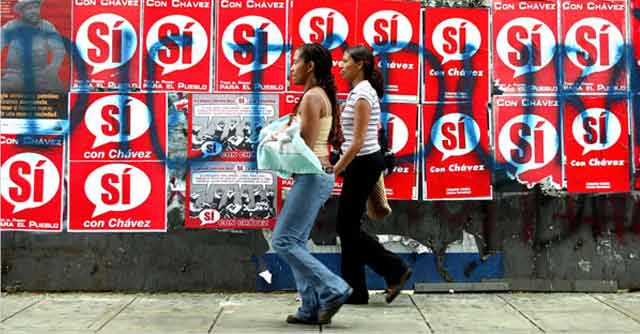
Posters
calling for “Yes”
vote on constitutional referendum in support of President Chávez
scrawled
over with right-wing opposition griffiti saying “dictatorship.” (Photo: Juan Barreto/AFP)
The panoply of
constitutional reforms certainly reflect a shift in the political face
of the
Bolivarian Revolution, which has gone through several incarnations
according to
the latest influences on its leader (and the current price of oil).
After being
associated early on with ex-Communist Party guerrilla leader Douglas
Bravo, in
the mid-1990s Chávez was advised by one Norberto Ceresole, an
ultra-rightist
Argentine nationalist and ideologue of the carapintada movement
of
fascistic military officers left over from the Videla dictatorship.
Reacting to
the hostility of U.S. imperialism, Chávez in power has moved in
fits and starts
to the left, but always within the capitalist framework and always
leaving
actual power in the hands of the army.
Today Chávez is a close
ally of Fidel Castro’s Cuba, a bureaucratically deformed workers state,
and
even expresses admiration for the Russian Revolutionary Leon Trotsky,
but his
actual policies are far more timid. While talking of “21st century
socialism”
he has made clear his desire to work with capitalists. In fact,
ex-Colonel
Chávez has carried out very few nationalizations, far less than
General Lázaro
Cárdenas in Mexico in the 1930s or General Juan Perón in
Argentina in the ’50s.
As Time magazine (1 May) noted of his latest move to take
control of
heavy oil installations:
“But the truth –
one that
both Chavez and his archfoe, the Bush Administration, would prefer you
not know
– is that when it comes to oil nationalization, Hugo is hardly the most
radical
of his global peers. In fact, even after today's petro-theatrics,
Chavez is
just catching up with the rest of the pack..”
The
nationalization of Venezuela’s oil industry was carried out in 1976 by
Carlos
Andrés Pérez of the pro-imperialist Acción
Democrática (AD), a bourgeois party
affiliated with the social-democratic Second International.
The packet of
constitutional reforms includes a reference to the “Venezuelan
Socialist State”
(Article 16) and even a “Socialist Economy.” However, the latter is
defined
only as prohibiting “monopolies and latifundios” (large landed
estates), and
includes a whole range of property forms including “direct” and
“indirect
social property,” “communal property,” “collective property,” “mixed
property”
and … “private property” (Article 115). Thus capitalist ownership of
the means
of production now has constitutional status, including the guarantee
that any
expropriation will be by judicial sentence and with “timely payment of
fair
compensation.” Some “socialism”!
A number of the reforms
which have drawn the ire of Venezuela’s rightists and their imperialist
godfathers in Washington could have been implemented by any social
democrat.
Much has been made of the reference to a “six-hour workday,” but less
of the
fact that this is part of a “36-hour workweek” (Article 90), an hour
more than
the 35-hour workweek implemented under the popular-front French
government of
Socialist Lionel Jospin and maintained by subsequent conservative
cabinets.
Social security coverage would be extended to informal vendors, taxi
drivers,
housewives and others presently excluded (Article 87) – a significant
reform,
particularly as barely 40 percent of the population is presently
covered.
Yet how much security this
actually affords depends on the vagaries of the capitalist market. If
the price
of oil were to fall back to $9 a barrel, as it was when Chávez
came to power,
you can say goodbye to all this. Imperialist pundits rail against the
“irresponsible” economic policies of the Venezuelan president, often
accompanied by premature announcements that “That Chávez Thing
Is Over” (Newsweek,
29 May 2006). Even the most rabid, such as the New York Times
(29
November) Paris-based columnist Roger Cohen, are forced to admit that
“Certainly,
the oil money Chávez has plowed into poor neighborhoods … has
reduced poverty.
The United Nations Economic Commission for Latin America said last year
that
the extreme poverty rate had fallen to 9.9 percent from 15.9 percent.”
But that
doesn’t stop Cohen from frothing about the policies of the Venezuelan
leader as
“disastrous” and “grotesque.”
What really has the
imperialist rulers and their kept media riled up is the constitutional
amendments’ political provisos, particularly elimination of term limits
on the
presidency and provisions for emergency rule. Cohen sneeringly calls it
a “grab
for socialist-emperor status” by a “barracks-bred buffoon,” claiming it
would
“prod Venezuela from an oppressive rule comparable to Mexico’s under
its once
impregnable Institutional Revolutionary Party toward the dictatorial
absolutism
of Cuba.” This is pretty rich coming from a proponent of American-style
bourgeois “democracy” which “elects” its presidents through a contest
of who
can amass more millions from capitalist donors, or can get the Supreme
Court to
annul the popular vote; which monitors its citizens’ phone calls
without
judicial warrants, arrests thousands of immigrants and holds them
incommunicado
for months and even years; and engages in torture on a mass scale as
well as
slaughtering hundreds of thousands (Iraq) or millions (Korea and
Vietnam) of
civilians.
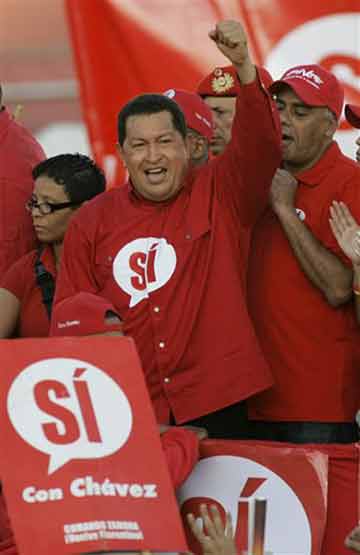 Hugo
Chávez at closing rally of campaign for "yes" vote, November 30.
(Photo: Ricardo Mazalan/AP)
Hugo
Chávez at closing rally of campaign for "yes" vote, November 30.
(Photo: Ricardo Mazalan/AP)
If Hugo Chávez did to even
one political prisoner what the U.S. imperialist rulers routinely due
to
thousands, there would be a deafening hue and cry from the laptop
liberal
pundits. A more balanced judgment comes from a Washington economist,
Mark
Weisbrot, who wrote: “Perhaps it is because I am from Chicago, and had
only one
mayor from the time I was born until I graduated college, that I am
unable to
see this as the making of a dictatorship. Not to mention that if
Hillary
Clinton is elected next year, we will have Bushes and Clintons as heads
of
state for a full consecutive 24 years, and possibly 28” (New
Statesman,
21 November). Brazilian president Lula, hardly a radical, asked why no
one
complained of Margaret Thatcher ruling Britain for so many years.
As for emergency rule, the
reforms allow for the president to suspend certain constitutional
guarantees in
a national emergency, including the right to information and due
process, but
not including prohibitions on torture, holding prisoners incommunicado
or
forcible disappearances. Nobody in the bourgeois media has bothered to
mention
that the U.S. routinely violates the last three prohibitions and is presently
being governed under a state of national emergency as part of
the post-9/11
“war on terrorism” (not to mention such draconian laws as the U.S.A.
PATRIOT
Act). And while Chávez would be required to present his
emergency measures to
the National Assembly within eight days, George W. Bush last May signed
into
law a National Security and Homeland Security Presidential Directive
(NSPD-51
and HSPD-20) which supersedes the National Emergency Act by allowing
the
president to assume dictatorial powers over all federal, state, local,
territorial and tribal governments, as well as private sector
organizations in
a national emergency without any form of Congressional approval or
oversight.
And no one voted on that.
In Venezuela, ex-leftist
Teodoro Petkoff’s labeled the amendments a “constitutional coup,” while
General
Baduel declared, “I categorize it as a coup d’état.” Others have
said it would
make Chávez a “dictator-for-life.” Yet the fact that Baduel
called on military
officials to “assess carefully” the changes that the government
proposed “in a
hasty manner and through fraudulent procedures” amounted to a scarcely
veiled
call for a real coup d’état by the military.
As for term limits, this is
a pseudo-democratic measure that in fact limits the right of the
population to
vote for whomever it wishes; the only reason it even appears democratic
is the
recognition that under the fake democracy of capitalism, incumbents
have enormous
power to get themselves re-elected. The fact that the limits are
removed only
for the head of state, however, points to a shift toward a presidential
regime
in which a strong executive with reinforced powers is increasingly
independent
of any parliamentary control.
The emergency measures are
another matter. In conditions of imperialist aggression and
counterrevolutionary attack, we defend particular repressive measures
directed
against bourgeois reaction, whether undertaken by Chávez’
“Bolivarian” regime
against coup-plotting media, by the Nicaraguan Sandinistas against
U.S.-financed contra mouthpieces or by Abraham Lincoln against
pro-Confederate
newspapers (see “Venezuela: Battle Over the Media,” The
Internationalist
No. 26, July 2007). But for a capitalist government to arm itself with such emergency measures in advance is an
invitation to use them not only against coup plotters but also against
militant
workers’ struggles. Communists oppose such laws giving capitalist
rulers carte
blanche to eliminate democratic rights, whether in imperialist or
semi-colonial
countries.
Some of the political
reforms are positive, including outlawing discrimination on the basis
of
ethnicity, sex or sexual orientation, religious creed or social
condition
(Article 21), recognizing Afro-Venezuelans as a community along with
indigenous
peoples (Article 100) and lowering the voting age to 16 (Article 64).
Others,
such as proclaiming the right to adequate, comfortable housing with
basic
services (Article 82) and the right to a job and duty to work (Article
87), are
pious wishes that cannot be guaranteed under capitalism, no matter what
the
Constitution says on paper. The provisions about revoking mandates of
elected
officials (Article 72), while an advance over the institutional
bonapartism of
U.S.-style bourgeois “representative democracy,” are far from the
“participatory democracy” they claim to represent. A recall election
half-way
through an elected term is a minimal control, which can easily be
sidestepped
by a determined executive, but far less than even a parliamentary
regime.
Under the rubric of
“people’s power” (Article 136), the reforms refer to the constitution
of
“councils of working people,” but only as organs of municipal
self-government
along with councils of peasants, students, artisans, sports, youth,
women,
fishermen and others. The reforms provide for setting up a “Communal
City” as
part of a “new geometry of power,” but such “communes” and “communal
self-government” entities would be set up and its authorities named by
the
“National Executive Power” (Article 16). So in the guise of “poder
popular,”
this actually establishes local bodies totally controlled by the
presidency.
And finally, in Article
236, there is a long list of powers of the presidency, including
creating or
eliminating provinces, federal districts, cities, regions and
districts, as
well as naming or removing their authorities; naming vice presidents;
declaring
states of exception and suspending or restricting constitutional
guarantees;
issuing enabling acts and decrees; dissolving the National Assembly,
and
“anything else indicated by the Constitution or by law,” subject only
to
ratification by the vice presidents (named by the president).
This is a program for a
bonapartist “strong state” regime. The inclusion of plebiscites to
episodically
approve the actions of the executive is a traditional mechanism of
providing a
veneer of popular legitimation for such dictatorial regimes going back
to Louis
Napoléon Second Empire and Napoléon Bonaparte’s First
Empire in France. It is
light years away from the workers democracy based on soviets
(workers and peasants councils), in which all representatives are
subject to
immediate recall at any moment by the councils whose decisions they
carry out.
This is what gave the
Russian soviets tremendous flexibility as organs of revolutionary
struggle,
enabling the Bolsheviks to become the majority and oust the previous
Menshevik
and Social-Revolutionary leaders of the bourgeois Provisional
Government. It
then provided the framework for establishing a workers state, the
dictatorship
of the proletariat, in which the fiction of “representative democracy”
(in
which electors are herded to the polls to vote every few years in the
illusion
that they are picking the rulers) was replaced by working bodies
directly
involving the working masses.
In contrast, the amended
Venezuelan Constitution sets up a top-down regime in which virtually
everything
is decided by an all-powerful president, ratified by his appointed
underlings and
periodically acclaimed by the populace. If Venezuela were a workers
state, it
might provide the forms for a bureaucratic regime such as Castro’s
Cuba, as
charged by Venezuelan right-wingers. But Venezuela remains a
capitalist
state in which all of this only serves as window-dressing for a
state power
resting on the guns of the bourgeois army. For socialists to approve
such
measures would be to renounce the program of proletarian revolution.
Bourgeois Bonapartism
or
Workers Revolution
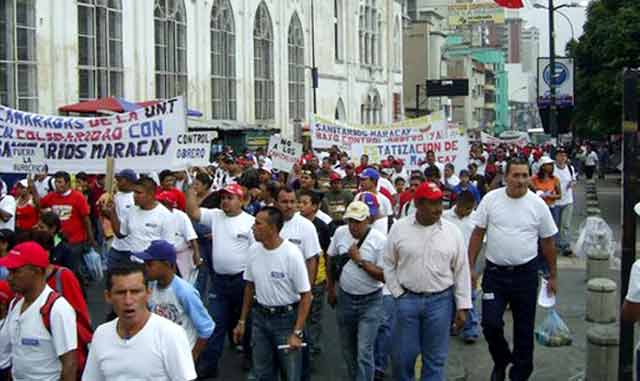
Workers
of occupied Sanitarios Maracay plant and supporters march in Caracas,
14 December 2006,
demanding nationalization under workers control. Four months later,
police and National Guard
attacked workers' caravan. (Photo: Hands Off Venezuela)
Currently, the reactionaries
are parading the figure of General Raúl Baduel, a “chavista
of the first
hour” going back to 1982, who was Venezuela’s defense minister from
2004 until
retiring earlier this year and who played a key role in saving
Chávez during
the 2002 coup attempt. While some chavistas try to minimize
this,
claiming for example that Baduel and his fellow officers moved against
the coup
plotters only after the masses came into the streets in defense of the
deposed
president (not true, it was the other way around), the fact is that his
defection represents a serious
fracturing of the Bolivarian political establishment at the top. Other
generals
on active duty are rumored to be ready to break with Chávez. The
“social-democratic” PODEMOS (Por la Democracia Social) party, another
former
pillar of support for Chávez which refused to join the PSUV, has
also called
for a “No” vote on the referendum.
In fact, while Chávez has
broad support among poor and working people, from the beginning his
political
apparatus has been heavily populated with bourgeois politicians and
military
officers. The Movement for the Fifth Republic (MVR), his main political
vehicle
until the formation of the “socialist” PSUV, was shot through with
corrupt
careerists. Such elements were so notorious that they are popularly
known as
the boliburguesía, often described with adjective
“hummera” to indicate
their predilection of these nouveau riche chavistas for buying
high-priced
Hummer SUVs. Chávez has also promoted a “socialist”
businessmen’s association,
Empresarios por Venezuela (Empreven), who are prepared to work with the
regime,
for a price. Again, no surprise. Mexico under the Institutional
Revolutionary
Party (PRI) had a similar layer of private capitalists who profited
handsomely
from the heavily statified capitalist economy.
We have noted in the past
(see “Venezuela: Workers to Power,” The Internationalist No.
22,
September-October 2005) that Chávez heads a “bourgeois
nationalist government
of a ‘bonapartist’ character, with its base in the armed forces, but
with
characteristics peculiar to semi-colonial countries.” It is not simply
a
military/police dictatorship such as Chile under Pinochet or Argentina
under
the junta (1976-83). As Trotsky noted in elaborating his perspective of
permanent revolution, in countries of belated capitalist development, a
weak
national bourgeoisie is sometimes obliged to maneuver between
imperialism and
the proletariat. Writing of the Mexican government of Lázaro
Cárdenas, he noted
that such a regime has a “bonapartist character sui generis”
(of a
distinctive or unique sort).
While seeming to raise
itself above classes, in reality such a regime serves the bourgeoisie
by making
concessions to the imperialists or to the working class (such as
Cárdenas’
nationalization of the railroads and oil industry, or Chávez’
experiments in
“co-management”). “Revolutionary” rhetoric does not change the class
character
of such governments, and in fact many “Third World” capitalist regimes
describe
themselves as “socialist” based on the fact that they have large
state-owned
sectors of the economy. Yet this is simply a means of accumulating
capital
which will eventually be parceled out to a nascent “national”
bourgeoisie when
it becomes strong enough, such as occurred in Mexico over the last
couple
decades.
Facile comparisons with
Cuba ignore the basic fact that while Castro took power at the head of
a petty-bourgeois
guerrilla band, following the disintegration of the dictator
Fulgencio
Batista’s army, Chávez’ base is the bourgeois armed forces.
These are
the same repressive forces that massacred thousands of poor Caracas
residents
in the 1989 caracazo upheaval, and slaughtered leftist
insurgents in the
1960s. There are many more Baduels ensconced at the command level of
the
officer corps, biding their time waiting for a propitious moment to
seize
power. And while Chávez may slough off pro-capitalist elements
the way East
European Stalinists got rid of bourgeois ministers one by one through
“salami
tactics” after World War II, there is no Red Army occupying Venezuela
to serve
as ultimate arbiter and power base for erecting a deformed workers
state.
Many self-proclaimed
socialists give political support to Chávez and his “Bolivarian
Revolution” in
Venezuela on the basis of its extensive social programs, despite the
fact that
the various “missions” are basically “welfare state” (asistencialista)
measures that do not put into question the capitalist economic
foundations of
the regime. Although the Venezuelan leader has his frictions with
particular
imperialists, particularly George W. Bush in the U.S. whom he has
vividly
compared to the devil, he has in no way broken with the imperialist
system.
The unprecedented high prices for Venezuela’s main export, oil, may
enable
Chávez to pay off rather than repudiate the foreign debt, and
U.S. energy
dependence on Venezuela may restrict the options of the imperialist
rulers. But
it will take a revolutionary working-class-led uprising to expropriate
the
bourgeoisie, by a workers and peasants government that then extends the
revolution
throughout the hemisphere and into the heart of imperialism.
Various leftists who abuse
the good name and revolutionary heritage of Trotsky to cover over their
opportunist maneuvers are tailing after Chávez. Among them are
the United
Secretariat of the Fourth International (USec), followers of the late
Ernest
Mandel, and particularly its French section, the Ligue Communiste
Révolutionnaire (LCR) which says of the constitutional changes
that it “can
only applaud and support such a reform” (Rouge, 20 September).
By far
the most uncriticial of the pseudo-Trotskyist chavistas is the
International Marxist Tendency (IMT) of the late Ted Grant and its
current
leader, Alan Woods, who fancies himself a Trotskyist guru to
Chávez. The small
Venezuelan group associated with the Grantite “Militant” tendency, the
Corriente Marxista Revolucionaria (CMR), describes itself as “part of
the
Bolivarian movement and the PSUV,” and calls for a massive “yes” vote
on the
referendum. No surprise there, for the IMT “Marxists” are part of
bourgeois
parties from Mexico (the PRD) to Pakistan (Bhutto’s PPP).
Another current which
sometimes pretends to follow Trotsky (but opposes his actual policies
on just
about everything) are the followers of the late Tony Cliff, who
characterized the
Stalinized Soviet Union as “state capitalist” and refused to defend the
USSR
against imperialism whereas Trotsky defended the Soviet Union as a
bureaucratically degenerated workers state. The British mother section
of the
International Socialist Tendency (IST) has been critical of
Chávez
“bureaucratic state machine that continues to sustain capitalist social
relations,” while other sections of this loose social-democratic
federation
enthusiastically embrace Chávez’ PSUV. The estranged American
Cliffites, the
International Socialist Organization (ISO) recently published an
extensive
front-page article on “What’s Really Happening in Venezuela” (Socialist
Worker, 30 November) in which they manage to take no position on
the
constitutional referendum while trying to sound sympathetic to the
Chávez
regime.
What’s behind this
confusion from a current that usually uncritically hails “Third World”
nationalist caudillos is that the people they have been tailing
after in
Venezuela are split on what line to take on the reforms. Part of the
leadership
of the Unión Nacional de Trabajadores (UNT – National Workers
Union) headed by
Stalin Pérez is calling for a “Yes” vote, while another sector
led by Orlando
Chirino, until now allied with Pérez in the C-CURA (Current for
Revolutionary
Class Unity and Autonomy) caucus, is calling for abstention and casting
a blank
ballot (voto nulo). This follows an earlier dispute in C-CURA
and its
allied Partido Revolución y Socialismo (PRS) over whether to
enter the PSUV,
with Pérez opting for entry and Chirino opposed. The
UNT/C-CURA/PRS managed to
establish itself as the leading organized representatives of the
Venezuelan
workers, defeating the CTV (Confederation of Venezuelan Workers) allied
with
the bourgeois right-wing opposition, and outflanking the unconditional chavistas.
But it has been bedeviled from the beginning by the riddle of how to
oppose
Chávez’ attacks on the workers while not breaking from the
popularity he enjoys
among Venezuela’s impoverished masses.
The answer is: it can’t be
done, you have to choose. To be sure, politically opposing the leader
of the
Bolivarian “revolution” while defending the regime militarily against
counterrevolution and imperialism is a difficult task in today’s
polarized
situation, where the division between chavistas and anti-chavistas
is drawn in blood. Taking an independent stance would undoubtedly not
be
understood today by many workers mesmerized by the nationalist caudillo.
But for Marxists, what’s fundamental is the class division separating
all
currents of the bourgeoisie, on the one hand, from the working class
allied
with poor peasants and other oppressed sectors on the other. Only by
insisting
on a class line, whatever the cost in temporary popularity, can
communists prepare the working people for the revolutionary struggles
ahead.
For Chávez will, without
any doubt, clamp down on any act of working-class independence from his
regime.
He accused UNT leaders of being “poisoned” and sharply denounced any
trade-union autonomy from the PSUV, even quoting Rosa Luxemburg against
them!
(Of course, in her 1906 work on The Mass Strike, the Political
Party and the
Trade Unions, Luxemburg was responding to reformist trade-unionists
who
wanted to take their distance from the social-democratic workers
party,
whereas Chávez is opposing independence by leftist
trade-unionists from the
control of a bourgeois party that is the bureaucratic
political
apparatus of the capitalist state.) But more than that, the officials
of the
“socialist” regime have cracked down on leftist-led struggles by
Venezuelan
workers.
A case in point is the
treatment dished out to the government workers union by the Labor
Ministry.
According to an account in the newspaper of the British Socialist
Workers
Party:
“The elected
representatives
of Fentrasep, the public employees' trade union with some 1.5 million
members,
went to the Ministry of Labour in mid-August to renegotiate the
collective
contract for their members. The minister, Ramón Rivero, is a
member of the
Bolivarian Trade Union Federation and an ex-Trotskyist. He refused to
meet with
the delegation and locked them inside a room in the ministry. No food
or drink
was provided; the delegates' families passed them through the windows.
After
six days they were driven out by hired thugs.”
–Socialist
Review,
October 2007
It should be
noted that the leader of FENTRASEP, Ramón Arías, belongs
to that wing of the
UNT and C-CURA which opposed Chirino and entered the PSUV (while
calling for
purging corrupt bureaucrats and employers from the party). Another
example is
what happened to the workers at Sanitarios Maracay, manufacturers of
toilets,
who have occupied their plant for the last year. When the workers were
traveling by bus to Caracas on April 24 to demand expropriation of the
company
under workers control, they were stopped on the highway by the Aragua
state
police and National Guard who fired on the workers with buckshot,
wounding 14
and arresting 21. These workers were organized in the FRETCO
(Revolutionary
Front of Workers in Occupied Factories) linked to the Grant/Woods
Militant
tendency which has been the loudest cheerleaders for Chávez on
the
international left.
So here we have two cases
of anti-union repression by the military-based “socialist” regime
directed
against supporters of the regime. One can imagine how
Chávez & Co.
would react to a militant struggle led by leftist workers politically opposed
to their bonapartist government.
Today, the active threat in
Venezuela comes from the capitalist ultra-right wing allied with U.S.
imperialism, which has never let up in its drive to overthrow the
nationalist
government that dared to flout the diktats from Washington. The
Internationalist Group and League for the Fourth International have
repeatedly
called to defend Venezuela against imperialist aggression and internal
counterrevolutionary forces who would drown the workers in blood. In
2002-03
bosses’ lockout we called for workers to seize the shuttered plants and
impose
workers control, to organize workers militias, and to form workers
councils to
organize
supplies of necessary goods and revolutionary resistance to the
pro-imperialist
coup.
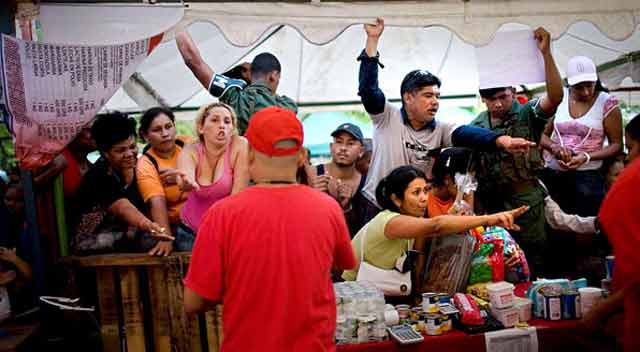
Outdoor
market in Caracas. Capitalists are trying to create food shortages to
protest price controls.
Workers should seize control of agricultural/food manufacturing and
marketing system and
impose workers control. (Photo: Rodrigo Abd/Associated Press)
Today, it is urgent to put
a halt to the bosses’ sabotage, in particular their attempts to create
artificial food shortages, by seizing control of the entire
agricultural/food
manufacturing and marketing chain and imposing workers control. Such
energetic
action by the workers movement would certainly be opposed by sectors of
the
“Bolivarian bourgeoisie” in power. Hence it must be linked to a whole
program of
transitional measures leading to the seizure of power by the working
class.
This was the purpose of the 1938 Transitional Program, the founding
program of
the Fourth International, which Trotsky intended to “help the masses in
the
process of the daily struggle to find the bridge between present demand
and the
socialist program of the revolution. This bridge should include a
system of
transitional demands, stemming from today’s conditions and from today’s
consciousness of wide layers of the working class and unalterably
leading to
one final conclusion: the conquest of power by the proletariat.”
This was also the method of
Lenin in his September 1917 pamphlet on The Impending Catastrophe
and How to
Combat It. Here the Bolshevik leader was responding to the
disruption of
production and distribution of grain as well as coal and other vital
raw
materials by rail stoppages and hoarding that were causing dire food
shortages
and a looming famine, thereby threatening the revolution. In his
pamphlet,
Lenin called for revolutionary action by the workers, through the
soviets,
rather than begging the capitalist government, which was in league with
the
hoarders and disrupters. His program included workers control,
nationalization
of the banks, and fighting for all power to the soviets. He wrote:
“In point of fact,
the
whole question of control boils down to who controls whom, i.e., which
class is
in control and which is being controlled. In our country, in Republican
Russia
… it is the landowners and capitalists who are still recognised to be,
and
still are, the controllers. The inevitable result is the capitalist
robbery
that arouses universal indignation among the people, and the economic
chaos
that is being artificially kept up by the capitalists. We must
resolutely and
irrevocably … pass to control over the landowners and
capitalists by
the workers and peasants. And this is what our
Socialist-Revolutionaries and
Mensheviks fear worse than the plague.”
What was put forward as a program in
September was then carried out in the October Revolution of 1917.
Today, while vigilantly
mobilizing the workers and impoverished masses against the capitalist
saboteurs, including those incrusted in the “Bolivarian” state
apparatus,
it is necessary above all to build an authentically Leninist-Trotskyist
revolutionary workers party. It must be based on the Trotskyist program
of
permanent revolution, understanding that in the present imperialist
epoch, even
achieving basic democratic tasks including agrarian revolution,
national
liberation and democracy for the exploited and oppressed requires that
the
working class take power, backed by the peasantry and urban poor, to
sweep away
the capitalist state, establish a workers and peasants government to
expropriate the bourgeoisie and spread the revolution internationally.
The choice is revolution or
counterrevolution – and no amount of
constitutional fiddling will resolve it. The question is power, kto/kogo,
as Lenin put it: who controls whom? n
To contact the Internationalist Group and the League for the Fourth International, send e-mail to: internationalistgroup@msn.com